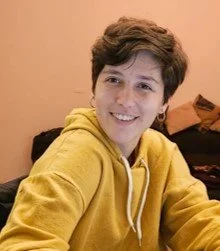
We believe that diversity in cultural, ethnic, gender identity and
scientific background is the most fertile ground for discovery.
Horacio de la Iglesia
Professor of Biology
I finished my undergraduate studies in Biology at the University of Buenos Aires, Argentina. I got my PhD in Neuroscience and Behavior at the University of Massachusetts, Amherst, where I studied the neuroanatomical interactions between the master circadian clock of mammals and the brain centers that control reproduction. I then continued my research on the neural control of circadian rhythms as a Post-doctoral Fellow and as an Instructor at the University of Massachusetts Medical School, while I was also an Instructor at Harvard University. I joined the University of Washington Department of Biology in 2003.
We thank Alek Helgesen-Thompson for his help with our website design
I am a postdoc investigating the nature by which fear entrains (synchronizes) circadian rhythms. Disruptions in circadian rhythms have been identified as a core feature of many anxiety disorders, such as post-traumatic stress disorder. However, the underlying mechanisms causing these long-lasting effects remain unclear. My current research is centered around the usage of an emergent diurnal-rodent model, the antelope ground squirrel (Ammospermophilus leucurus), to understand the behavioral, physiological, and neural basis of how the circadian time-stamp of fear is manifest in organisms. With this research, I aim to generate a comprehensive understanding of fear entrainment that is more translatable to human health than existing nocturnal models.
Prior to this appointment, I completed my BS in Integrative Biology at the University of Illinois Urbana-Champaign in 2015 and my PhD in Biology at Northern Arizona University in 2021. As an ecophysiologist by training, I am also ingrained with a curiosity for understanding behavioral and physiological adaptations of animals in the wild. I am excited about coupling this research background in free-living animal systems with the experimental techniques used in the de la Iglesia lab to pursue innovative research projects here at UW and beyond.
Victor Zhang
Postdoctoral Researcher
Asad Beck
Graduate Student
I am a graduate student in the UW Graduate Program in Neuroscience. My interests broadly lie in circadian rhythms, epilepsy, brain-computer interfaces, and neuroethics. I joined the de la Iglesia lab in the Spring of 2019, and have focused on using machine learning algorithms to forecast seizure onset in mice models of epilepsy. Eventually, I plan on shifting focus to epilepsy in humans as well.
I graduated from San Diego State University in 2018, with a B.A. in Psychology (double minoring in Philosophy and English). Outside of lab, I spend my time baking, playing/writing music, and reading while walking around Seattle.
Sleep timing can be modulated by many different external forces such as light. Artificial light has given humans the ability to extend their nighttime routines past sunset. We have found that moonlight has a similar effect on sleep in indigenous communities in South America, that live primarily without electricity. Surprisingly, this was also seen in students living in Seattle even though it is a highly light-polluted city and no awareness of moonlight. I am interested in further studying this lunar sleep modulation by investigating how the lunar cycle influences the sleep regulation systems.
Alicia Rice
Graduate Student
In mammals circadian rhythms in physiology and behavior are coordinated by a central brain pacemaker, the SCN. My research focuses on how SCN circuits consisting of neurons and glia give rise to emergent properties that contribute to the timekeeping mechanism. Specifically, I am investigating how these circuits change their organization on a daily and circadian basis.
I graduated from Gonzaga University with a B.S. in biochemistry in 2018. I started my Ph.D. in the fall of 2018 with the UW Molecular and Cellular Biology program.
Alex Neitz
Graduate Student
I’m a postdoc studying how different environmental factors, such as school/work schedules, seasons, light exposure and moon phases, impact human sleep. To do so, we study human behavior (i.e. sleep timing), but we are also beginning studies that include sleep laboratory visits. The latter would allow us to understand the effect of environmental factors on human circadian and homeostatic regulation of sleep.
I finished my undergraduate studies in Biology and Computer Sciences at the University of Buenos Aires, Argentina. I got a PhD in biology from the same University for studying how school start times modulate adolescents’ chronotypes, sleep and academic performance. I also taught Human behavior at Torcuato Di Tella University and Computer Science at the University of Buenos Aires.
Guadalupe Rodriguez Ferrante
Postdoc
Glorianna Gutierrez
Undergraduate Student
I am an undergraduate at the University of Washington, pursuing a B.S. in Neuroscience. As part of the ENDURE program, I joined the de la Iglesia lab as a student researcher in 2022. My research project focuses on using a machine learning algorithms to predict seizures in a mouse model of Dravet Syndrome, a genetic form of epilepsy, with the goal of creating a closed-loop system that prevents seizures before their onset.
I am an undergraduate student at UW studying molecular, cellular, and developmental biology. I am interested in the molecular inner workings of the suprachiasmatic nucleus, a structure in the hypothalamus that is responsible for the timing of bodily functions. Throughout the time I have been in this lab, I have been able to learn and fine-tune various laboratory techniques and quantitative analysis skills.
Bryn Carter
Undergraduate Student
Vivian Chen
Undergraduate Student
I am an undergraduate student in the de la Iglesia lab investigating the mechanisms of fear entrainment on circadian rhythms. Findings that establish connections between neural pathways involved in fear processing and sleep could offer valuable insights for individuals suffering from post-traumatic stress disorder, many of whom experience disturbances in their circadian rhythms.I am currently in my third year at the University of Washington, Seattle, pursuing a B.S. in Biology, with potential plans to pursue either/both medical school or graduate school in the future.
Alek Helgesen-Thompson
Undergraduate Student
Currently I am an undergraduate student at the university of Washington, pursuing a degree in Electrical and Computer Engineering. I am interested in how computation affects the different aspects of biological research. I am working on creating a closed loop seizure prediction model that can predict and prevent the seizure before its onset in a mouse model of Dravet syndrome.









